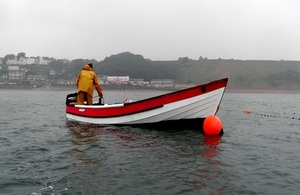Renewal of Yorkshire and North East Net Limitation Order to protect at-risk fish stocks
The Environment Agency is recommending continued protection for trout and salmon from coastal net fishing in Yorkshire and North East areas

The new ten year Net Limitation Order will replace the existing one due to end in December this year
The Environment Agency is recommending continued protection for salmon and sea trout in tidal waters from Berwick on Tweed to the mouth of the Humber estuary, following a month-long consultation which took place this spring.
The decision sets out a recommendation to introduce a new ten-year Net Limitation Order (NLO) to replace the existing one when it expires in December this year. It is based on scientific evidence around the impact of the net fishery, alongside consultation responses, and aims to balance the needs of conservation with those of the local economy.
If approved by the Secretary of State for the Environment, the new NLO will allow those who already have a licence to continue to fish for trout but no new licences will be granted. This will ensure the net fishery reduces in size and increases the necessary protections for fish stocks, without economically impacting existing licensees or coastal communities.
Net fishing for salmon will remain illegal due to the vulnerability of the species to exploitation by commercial net fisheries. Salmon and sea trout net fishing in the region has been limited in some way since the 1960’s and licenced since 1865. In the years since the first regional Net Limitation Order began in 1992, populations of salmon and sea trout have improved in some areas but remain vulnerable and at risk in others.
Evidence also shows an international decline in wild Atlantic salmon populations with the latest stock assessment report, from the Centre for Environment, Fisheries and Aquaculture Science, the Environment Agency and Natural Resources Wales, showing that 37 of the 42 salmon rivers (88%) in England now categorised as being ‘at risk’ or ‘probably at risk’. Sea trout stocks are also dropping in a number of areas and are under pressure from fishing exploitation as salmon stocks decline.
Salmon and sea trout populations are threatened by changes to their environment throughout their lifecycle caused by climate change and other human activities. The Environment Agency is looking at every stage of the species’ journey so that steps can be taken to increase their chances of survival. This includes making river systems more accessible by removing barriers to migration, improving water quality and reducing the exploitation of salmon and sea trout by both net and rod fisheries.
Jon Shelley, Environment Agency Senior Fisheries Specialist, said:
“The decline in the numbers of both salmon and sea trout is of great concern and we are determined to protect the future of these important species.
“Having carefully considered the available evidence, this action will help as many fish as possible return to waters across Yorkshire and the North East over time, without impacting those whose livelihoods currently rely on it.
“Every fish returned safely to our rivers could lead to improved numbers of adult salmon and sea trout spawning, helping to contribute to a reversal in the current decline of salmon and sea trout.”
The consultation report, a copy of the proposed new NLO, Environment Agency responses to all the issues raised during this year’s earlier consultation and information on ways to respond to the advertisement can be found here
Anyone wishing to respond to the advertisement may do so by email or by writing to Defra not later than 25 November 2022.